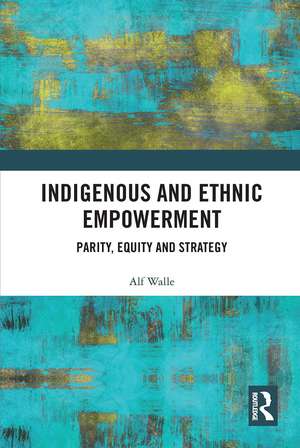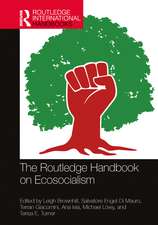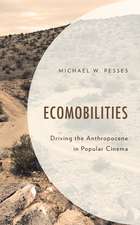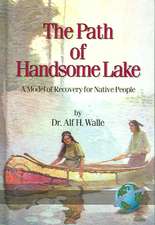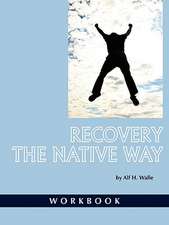Indigenous and Ethnic Empowerment: Parity, Equity and Strategy
Autor Alf Walleen Limba Engleză Paperback – 18 dec 2020
The book is distinctive because it helps people embrace opportunities and change on their own terms. As a result, leaders and their advocates will be better able to evaluate and respond to opportunities in an informed and systematic manner. Various business disciplines (such as accounting, finance, human resource management, organizational theory, and marketing) are discussed in ways that help the reader to envision both mainstream perspectives and the distinctive issues faced by ethnic enclaves.
| Toate formatele și edițiile | Preț | Express |
|---|---|---|
| Paperback (1) | 262.11 lei 6-8 săpt. | |
| Taylor & Francis – 18 dec 2020 | 262.11 lei 6-8 săpt. | |
| Hardback (1) | 1002.63 lei 6-8 săpt. | |
| Taylor & Francis – 15 noi 2018 | 1002.63 lei 6-8 săpt. |
Preț: 262.11 lei
Preț vechi: 320.11 lei
-18% Nou
Puncte Express: 393
Preț estimativ în valută:
50.15€ • 52.51$ • 41.50£
50.15€ • 52.51$ • 41.50£
Carte tipărită la comandă
Livrare economică 05-19 aprilie
Preluare comenzi: 021 569.72.76
Specificații
ISBN-13: 9780367732783
ISBN-10: 0367732785
Pagini: 270
Dimensiuni: 156 x 234 mm
Greutate: 0.56 kg
Ediția:1
Editura: Taylor & Francis
Colecția Routledge
Locul publicării:Oxford, United Kingdom
ISBN-10: 0367732785
Pagini: 270
Dimensiuni: 156 x 234 mm
Greutate: 0.56 kg
Ediția:1
Editura: Taylor & Francis
Colecția Routledge
Locul publicării:Oxford, United Kingdom
Public țintă
PostgraduateCuprins
List of Tables and Figures
Acknowledgements
Forward and Summary--------------------------------------------------
Chapter 1:Culture, Development and Economics--------------------------
Negotiating and Resolving Conflict:
Chapter 2: Negotiating with the Mainstream World---------------------------------
Chapter 3: Remedies for Conflict------------------------------------------------------
Chapter 4: Creating an Atmosphere of Empowerment----------------------------
Part 3: Commonly Used Tools
Chapter 5: Strategic Thought---------------------------------------------------------
Chapter 6: Organizational Concerns--------------------------------------------------
Chapter 7: Motivation------------------------------------------------------------------
Chapter 8: Accounting and Oher Tools of Evaluation----------------------------
Part 4: Providing Service
Chapter 9: Internal Service-----------------------------------------------------------
Chapter 10: External Service-----------------------------------------------------------
Chapter 11: Vulnerabilities and Reponses--------------------------------------------
Index
Acknowledgements
Forward and Summary--------------------------------------------------
Chapter 1:Culture, Development and Economics--------------------------
Negotiating and Resolving Conflict:
Chapter 2: Negotiating with the Mainstream World---------------------------------
Chapter 3: Remedies for Conflict------------------------------------------------------
Chapter 4: Creating an Atmosphere of Empowerment----------------------------
Part 3: Commonly Used Tools
Chapter 5: Strategic Thought---------------------------------------------------------
Chapter 6: Organizational Concerns--------------------------------------------------
Chapter 7: Motivation------------------------------------------------------------------
Chapter 8: Accounting and Oher Tools of Evaluation----------------------------
Part 4: Providing Service
Chapter 9: Internal Service-----------------------------------------------------------
Chapter 10: External Service-----------------------------------------------------------
Chapter 11: Vulnerabilities and Reponses--------------------------------------------
Index
Notă biografică
Alf Walle is a specialist in indigenous economic development and is a former professor of tribal management who worked with Alaska Natives above the Arctic Circle. In addition, he has extensive experience in Central America and in Asia. He is currently providing consulting services. His website is alfhwalle.com.
Recenzii
"Alf Walle, a well-known applied anthropologist, provides a clear-eyed, searching analysis of the complex issues related with indigenous, ethnic, and rural peoples all over the world fight to effectively solve the problems caused by outside economic and social intervention. A fascinating and accessible book, which is a signal achievement that is sure to raise the level of discussion with the discipline and become essential reading for anyone concerned with the future of indigenous, ethnic, and rural peoples, as well as the future of applied anthropology."Robert Guang Tian, Professor and Dean of Applied Anthropology Institute, Jishou University, PRC
"Alfe Walle essentially provides a handbook for reducing the distance between organizations engaged economic and social development and those populations—rural enclaves, ethnic minorities, indigenous people, distinctive cultural groups—who may not share the same understandings, values and goals of such development. Walle’s goal, the meaningful participation of affected communities in development, and their equitable sharing of benefits, is both rational and humane. His work covers methods of encounter, ways of working together, means of conflict resolution, strategy assessment, and evaluation and uses a wide array of examples from the United States and around the globe. In a world experiencing increasing globalization and its discontents and challenges to universal views of development, Walle’s work is a welcome guide that can help theoreticians and practitioners—and community leaders, members and advocates do their work in a more self-conscious, better way."
Richard Kurin, Distinguished Scholar and Ambassador at Large, Smithsonian Institution, USA
"I am delighted to endorse Alf Walle’s book titled Indigenous and Ethnic Empowerment. This books aim is to provide theoretical and applied knowledge for indigenous, et
"Alfe Walle essentially provides a handbook for reducing the distance between organizations engaged economic and social development and those populations—rural enclaves, ethnic minorities, indigenous people, distinctive cultural groups—who may not share the same understandings, values and goals of such development. Walle’s goal, the meaningful participation of affected communities in development, and their equitable sharing of benefits, is both rational and humane. His work covers methods of encounter, ways of working together, means of conflict resolution, strategy assessment, and evaluation and uses a wide array of examples from the United States and around the globe. In a world experiencing increasing globalization and its discontents and challenges to universal views of development, Walle’s work is a welcome guide that can help theoreticians and practitioners—and community leaders, members and advocates do their work in a more self-conscious, better way."
Richard Kurin, Distinguished Scholar and Ambassador at Large, Smithsonian Institution, USA
"I am delighted to endorse Alf Walle’s book titled Indigenous and Ethnic Empowerment. This books aim is to provide theoretical and applied knowledge for indigenous, et
Descriere
This book presents business methods in a manner that reflects the needs, desires and priorities of indigenous peoples and provides the tools communities need to envision and deal with the full impact of social and economic intervention.
